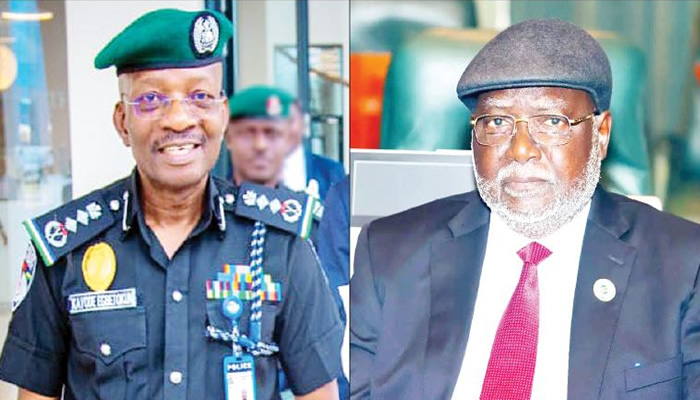
The spate of crime in Nigeria has remained a major challenge for successive governments at all levels. Beyond the acquisition of more lethal weapons to fight the menace, UTHMAN SALAMI examines measures the Federal Government can take to curb rising crime rate
Experts have said the Nigerian justice system lacks the power to curb the rising crime waves in the country. It is believed that the justice system is focused on dispensing punishments to offenders.
This system allows offenders to live with the pains of their offences, leaving out rehabilitation measures.
Victims of offences go beyond those directly harmed by the actions of the offenders. Others that may be regarded as victims include friends, community, and family members who often bear the stigma of having their loved ones in prisons.
As the saying goes, there is no justice without reconciliation. It is said that If the Nigerian justice system is not designed to get offenders to take responsibility for their crimes, crime-fighting will continue to move in a cycle.
Hence, experts say there is a need to give offenders a second chance to redeem themselves and become agents of reconciliation.
Findings of a 2007 study by Lawrence Sherman Heather Strang, titled “Restorative Justice: The Evidence”, show that restorative justice helps to reduce the “fear of the offender, especially for violence victims.”
It also help to achieve “”increased sense of security; reduced anger towards the offender; greater sympathy for the offender and the offender’s supporters; greater feelings of trust in others; increased feelings of self-confidence; reduced anxiety.”
A notable non-governmental organisation, the Prison Fellowship Nigeria, is leading the charge against the lopsided crime-fighting justice system.
The Prison Fellowship International through the PFN is bringing hope to victims and providing a second chance to offenders across correctional centres in Nigeria through its Sycamore Tree Project.
The STP as the name suggests is a regeneration and transformation initiative championed by the various churches which have come under one umbrella, to bring hope to offenders.
The STP aims to facilitate reconciliation between the offenders and the victims.
In its traditional way, the PFN, an affiliate of the PFI, recently trained 55 inmates of the Maximum Correctional Facility, Kirikiri, Apapa through the STP.
Despite the downpour that nearly soiled the ceremony on July 7, 2023, the volunteers further awarded certificates to the 22 female and 33 male inmates who participated in the eight-week-long programme at the correctional facility in Lagos.
Speaking with The PUNCH at the graduation ceremony last Friday, the Executive Director, PFN, Benson Iwuagwu, who spoke through the STP National Coordinator, Ms Taiwo Akinyemi, said the project allowed both the offenders and victims to reconcile and give room for peace by telling their stories to prevent a repeat.
Iwuagwu said, “This fellowship programme brings the offenders and victims to discuss what happened to stop such an incident from recurring. The victims come to tell their stories. Also, the offenders share their side of the story. The essence of this is to establish peace between the parties. Justice has not been done when peace is not the end product. STP Justice and Peace Initiative is to bring about peace between the parties.
Charging the Nigerian correctional facilities to consider the victims in restorative justice, the Chairman, PFN, Lagos State Chapter, Adeyemo Michael, said the project facilitated healing and acceptance for both parties.
He explained, “STP is to facilitate reconciliation between the victim and the offender. We believe that the punitive side of our correctional centres only takes care of the offenders but doesn’t take care of the victims. The victims too are hurting. The Sycamore Tree Project works on the reconciliation between the victims and the offenders. Some victims don’t really want to go to court. They only want the offender to say they are sorry for what they have done.”
While describing the participation of the inmates in STP Justice and Peace Initiative as impressive, the Special Adviser to the Executive Director, PFN, Felix Maurice, said the graduands had shown unalloyed commitment by embracing reconciliation and accepting responsibilities for the crimes they committed.
He further noted that their enrolment and participation in the STP attested to their preparedness and vows to turn a new leaf.
He said, “The performance of the inmates is great and wonderful. Since we started this programme a few years back, we have always had a good number of inmates that were always eager to be part of the programme. The most amazing aspect of it was during the time of Covid-19 when our volunteers were not even allowed to enter the correction facilities, they ran the programme seamlessly on our behalf. This is just to show the level of interest and love they have for the STP.
“We have developed inmate leaders that can hold this programme even if we are not around. This is because of the impact of the programme on their lives. The testimonies are not something I can begin to count at this point in time. STP is a demonstration of restorative justice. The current criminal justice goes after the offenders, ostracising the victims and the community out of the scheme.”
He added, “But when restorative justice comes in, it caters to other people who have been affected such as the victims, the offenders and the community. The STP brings all the parties together for a resolution to prevent a repeat. It is taking responsibility for our actions, and finding ways to make amends. This helps to bring healing to all parties involved in the crime. So that if similar event at a later date, they will not take the same route they had taken earlier.”
The graduation also saw inmates accepting responsibilities and the indelible harm their actions had caused others while pleading for forgiveness from their victims, vowing never to return to such offenses whenever they finally regain their freedom.
Commending the organisers for a hitch-free 15th edition of the project, STP graduand, Mrs Emilia Osakwe, who recently gained her freedom from the correctional centre after she reported a case of missing trucks that she gave to some clients without properly conducting a background check, told our correspondent that she became furious when the police detained her.
She felt the world was against her after she was taken to the Kirikiri Correctional Facility in Apapa.
Whilst describing the project as a healing programme for the offenders to start a new beginning and a renewed reason to live, she admitted that there was a turnaround in her life after she joined the Sycamore Tree Project.
The ex-inmate said, “It’s a very laudable programme. I was hurt and sick when I got to the correctional centre. But when I got to the STP, it helped me to heal. It was the beginning of me. Before then, I just existed. I got a renewed reason to live after I enrolled in the programme. I didn’t think I did anything wrong before I was brought to the Kirikiri correctional facility.
“But whilst I was going through the programme, I knew I had to take responsibility. I had a missing truck case where I loaded my clients with N25 million worth of goods and the driver ran away with it. I felt I would not have an issue with it if I did a thorough job. If I had done a background check on those trucks that got missing, I would have realised the trucks were fake. But STP was the beginning of my healing. After that, there was nothing holding me down because I have let go of all the hurt.”
She added, “But my message to the organisers is to beg them to continue to do the good job they have started. It has helped a lot of people. I am a testimony. There is another lady I know that STP has helped. When we were inside the cell we really don’t know what was inside of us. We were all in the denial stage. But when you enroll for STP, it helps you to realize your true self and accept what you have done before you can start a new life.
If justice is never done, regardless of the punishment melted on the offenders, so long reconciliation is not introduced into the system; Nigeria will continue to dance in a circle in its efforts to curb rising crime cases within its shores.









